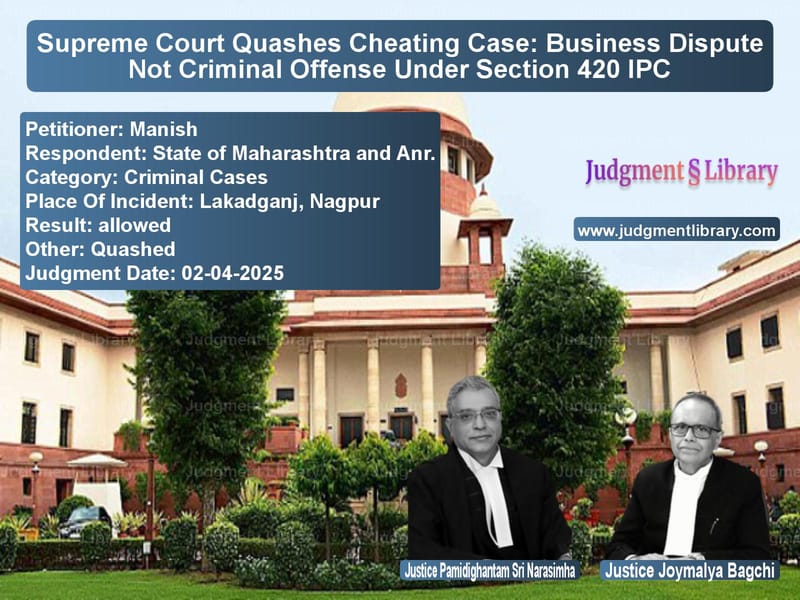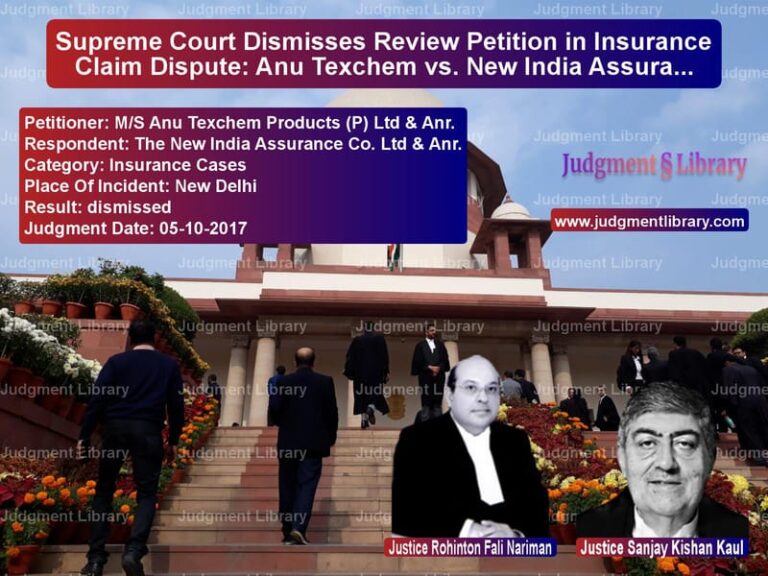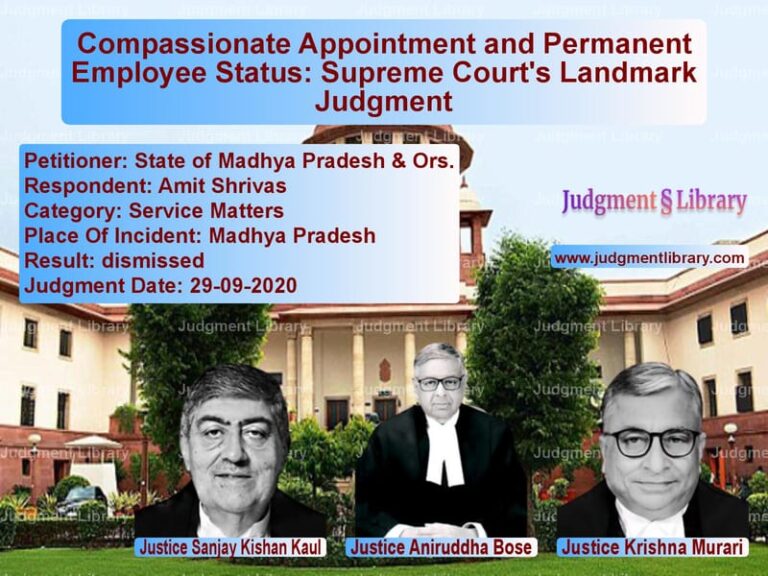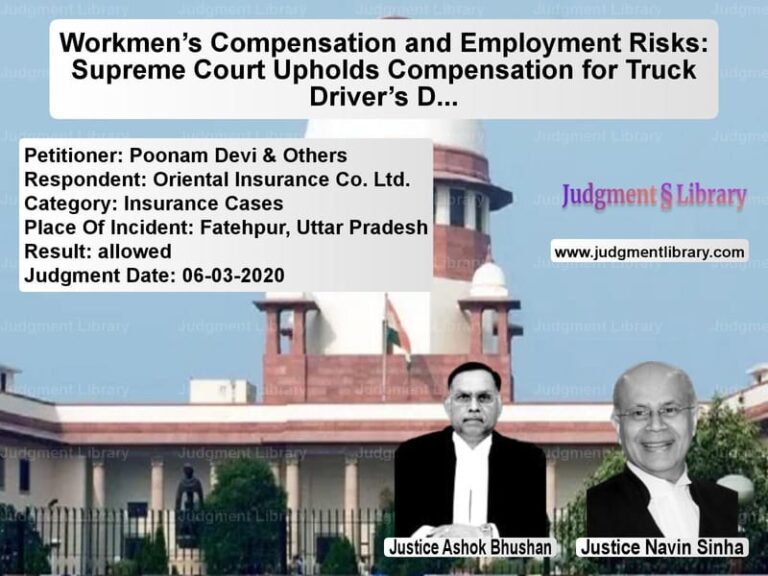Supreme Court Quashes Cheating Case: Business Dispute Not Criminal Offense Under Section 420 IPC
The Supreme Court of India recently delivered a significant judgment in the case of Manish vs State of Maharashtra & Anr., addressing the distinction between civil disputes and criminal offenses under Section 420 of the Indian Penal Code (IPC). The judgment, pronounced on April 2, 2025, by Justices Pamidighantam Sri Narasimha and Joymalya Bagchi, quashed the FIR registered against the appellant, holding that a mere breach of contract does not constitute cheating unless dishonest intention is proven from the inception of the transaction.
Background of the Case
The case arose from a business transaction between the appellant, Manish, and the second respondent, Nitin Agrawal. Between 2015 and 2017, Nitin supplied coal to Manish under various invoices with a 15-day credit period. While initial payments were made, Manish subsequently defaulted, leading to an outstanding debt of Rs. 76,82,883/-. On July 23, 2020, the parties executed a notarized agreement wherein Manish agreed to repay Rs. 80,00,000/- in five installments by January 31, 2021. However, only Rs. 5,00,000/- was paid, prompting Nitin to file a complaint under Section 156(3) of the CrPC, leading to the registration of FIR No. 80/2022 under Section 420 IPC at Lakadganj Police Station, Nagpur.
Key Arguments
Arguments by the Appellant (Manish)
The appellant contended that:
- The dispute was purely commercial in nature, arising from a breach of contract due to business losses, and did not involve any dishonest intention at the inception of the transaction.
- The FIR was an abuse of the criminal justice system to recover outstanding dues, which should be pursued through civil remedies.
- The High Court erred in relying on the notarized agreement to infer dishonest intention, as the agreement was a subsequent attempt to settle the dues and not part of the original transaction.
Arguments by the Respondents (State of Maharashtra & Nitin Agrawal)
The respondents argued that:
- Manish had fraudulently represented himself as a ‘reputed, trustworthy, and creditworthy’ businessman to induce Nitin to supply coal, with no intention to pay.
- The notarized agreement, wherein Manish acknowledged the debt and agreed to repay, corroborated the dishonest intention from the outset.
- The case fell within the ambit of Section 415 IPC, as the appellant’s actions met the ingredients of cheating.
Court’s Analysis and Decision
Distinction Between Civil Dispute and Criminal Offense
The Supreme Court emphasized the distinction between a mere breach of contract and cheating under Section 420 IPC. Referring to illustration (g) of Section 415 IPC, the Court observed:
“If A, at the time of obtaining the money, intends to deliver the indigo plant, and afterwards breaks his contract and does not deliver it, he does not cheat, but is liable only to a civil action for breach of contract.”
The Court held that to establish cheating, the prosecution must prove dishonest intention at the inception of the transaction, not merely a subsequent failure to fulfill contractual obligations.
Findings on the Facts
The Court noted that:
- The appellant had substantial assets and was considered creditworthy by bankers, as evidenced by loans sanctioned even after the default.
- There was no evidence to show that the appellant was insolvent or bankrupt at the time of the transaction, or that he had knowingly suppressed his financial status.
- The notarized agreement was a subsequent settlement and did not prove dishonest intention at the inception of the transaction.
The Court relied on the principle laid down in Hridaya Ranjan Prasad Verma vs State of Bihar:
“Did the offending party make dishonest representation at the inception of the transaction and induce the other party to part with property, or act in a manner which but for such representation, the latter would not have done?”
Quashing of FIR
The Court concluded that the FIR did not disclose the ingredients of cheating and was an attempt to criminalize a civil dispute. The judgment stated:
“Failure to pay due to unfortunate business losses cannot be clothed with culpability and the process of criminal law utilized to recover outstanding dues.”
Accordingly, the Court quashed the FIR and allowed the appeal.
Conclusion
This judgment reaffirms the principle that criminal liability for cheating cannot be imposed solely on the basis of a breach of contract. The prosecution must establish dishonest intention at the inception of the transaction, and mere failure to fulfill contractual obligations does not constitute a criminal offense. The decision safeguards against the misuse of criminal proceedings to pressure parties in civil disputes, ensuring that commercial disagreements are resolved through appropriate civil remedies.
Petitioner Name: Manish.Respondent Name: State of Maharashtra and Anr..Judgment By: Justice Pamidighantam Sri Narasimha, Justice Joymalya Bagchi.Place Of Incident: Lakadganj, Nagpur.Judgment Date: 02-04-2025.
Don’t miss out on the full details! Download the complete judgment in PDF format below and gain valuable insights instantly!
Download Judgment: manish-vs-state-of-maharashtra-supreme-court-of-india-judgment-dated-02-04-2025.pdf
Directly Download Judgment: Directly download this Judgment
See all petitions in Fraud and Forgery
See all petitions in Bail and Anticipatory Bail
See all petitions in Cyber Crimes
See all petitions in Theft and Robbery Cases
See all petitions in Attempt to Murder Cases
See all petitions in Judgment by P.S. Narasimha
See all petitions in Judgment by Joymalya Bagchi
See all petitions in allowed
See all petitions in Quashed
See all petitions in supreme court of India judgments April 2025
See all petitions in 2025 judgments
See all posts in Criminal Cases Category
See all allowed petitions in Criminal Cases Category
See all Dismissed petitions in Criminal Cases Category
See all partially allowed petitions in Criminal Cases Category







